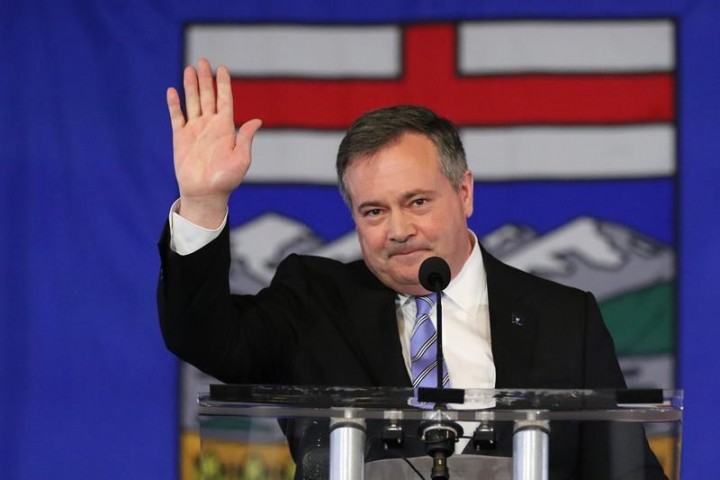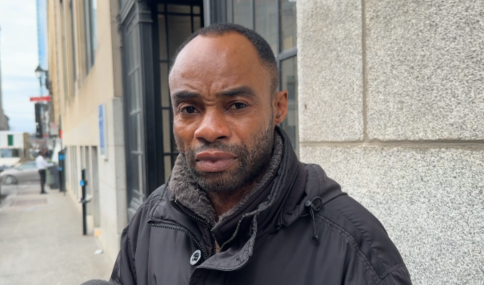Politics
Alberta United Conservatives head to polls on final voting day to replace Kenney


|
|
CALGARY — Albertans will learn later Thursday who the new premier of the province will be.
Voting is wrapping up by members of the United Conservative Party to select a successor to Premier Jason Kenney.
Kenney announced in the spring he was leaving after receiving 51 per cent in a party leadership review.
“I’m feeling great. I’m just doing my job. I’m trying to deliver on our commitments to Albertans as long as I have this responsibility,” he said Thursday morning while at a news conference in Calgary.
Kenney announced that 50 previously promised intensive care beds are now ready and efforts are underway to bring in more nurses from abroad to address labour shortages.
Kenney said he’s often asked why he stuck around as premier after the leadership review instead of handing the reins to an interim leader.
“Believe me, I didn’t get into politics for the adulation. I got into public service to get things done,” he said.
“And if we had shifted to an interim government for five months, very little would have gotten done … the province would have gone through a degree of policy paralysis for the better part of six months just as we’re trying to recover from COVID.”
There are 124,000 eligible voters in the leadership race, many of whom cast early ballots by mail.
In-person voting stations were also set up at five locations in various regions Thursday, and the winner was to be announced later in the day in Calgary.
There are seven candidates in the race, including four former members of Kenney’s cabinet, but one-time Wildrose Party leader Danielle Smith is the perceived favourite to win.
Political observers and pollsters have said whoever wins needs to start talking about issues that are top of mind for Albertans.
The leadership debate has been dominated by ways the province can assert greater independence from the federal government.
Pollster Janet Brown and political scientist Lori Williams said Albertans are more concerned about inflation, long waits for health care and jammed emergency wards in hospitals.
This report by The Canadian Press was first published Oct. 6, 2022.
The Canadian Press
Politics
Quebec employers group worried 'political' immigration debate will hurt jobs – CBC News


The latest spat between Quebec and Ottawa over immigration is based on politics and not the reality of the labour market, says the head of a major employers group.
“In some ways, it’s deplorable,” said Karl Blackburn, president and CEO of the Conseil du patronat du Québec.
His comments come as Quebec Premier François Legault is threatening to hold a “referendum” on immigration if the federal government doesn’t take rapid action to stem the rising number of temporary immigrants, which include foreign workers, international students and refugee claimants.
“The majority of Quebecers think that 560,000 temporary immigrants is too much,” Legault said last week. “It’s hurting our health-care system. We don’t have enough teachers, we don’t have enough housing.”
Provincial Immigration Minister Christine Fréchette said the province’s demands include stronger French-language requirements in immigration programs managed by the federal government and a reduction in the number of asylum seekers and temporary workers.
While Prime Minister Justin Trudeau rejected the province’s bid for full control over immigration — currently a shared responsibility — Legault said in March that his federal counterpart had shown openness to some of the province’s demands, and agreed with him on the need to reduce temporary immigrants.
Businesses affected by visa cuts
Blackburn, however, disagrees that there are too many temporary workers, who he said are “working in our businesses producing goods and services.” Their numbers, he added, reflect the needs of the labour market and of an aging society.
He said he supports the Legault government’s call to reduce the number of asylum seekers in the province because Quebec has received a disproportionate share in recent years. But he denounced the federal government’s “improvised” decision to suddenly reimpose visas on some Mexican nationals earlier this year, a measure Quebec had pushed for as a way of reducing asylum claims.
He said that’s already having “direct effects” on businesses by restricting their ability to bring in workers. Any subsequent measures to reduce the number of temporary workers will further hurt Quebec’s economy as well as consumers who will no longer have access to the same goods and services, he said.
“It’s as if our governments knowingly agreed to cause companies to lose contracts for reasons of political partisanship and not based on economic growth, which is nonsensical in a way,” Blackburn said.


Politicians are unfairly blaming immigrants for shortages of housing, daycare spaces and teachers, when the real problem is government failure to invest in those areas, he added.
The long-running debate between Quebec and Ottawa has flared in recent months. Earlier this year, the premier wrote to Trudeau about the influx of asylum seekers entering Quebec, which has welcomed more than 65,000 of the 144,000 would-be refugees who came to Canada last year.
Quebec has demanded Ottawa reimburse the province $1 billion — the amount Quebec says it has cost to care for asylum seekers over the last three years.
Federal Immigration Minister Marc Miller said this week that no country would ever give up total control over immigration. But he said he and his provincial counterpart are having good discussions and agree on many matters, including limiting visas to Mexicans and protecting French.
While Legault has blamed the federal government for the “exploding” number of newcomers, the director of a research institute and co-author of a recent study on temporary immigrants says both Ottawa and Quebec have brought in measures in recent years to facilitate their arrival.
Multiple factors driving immigration surge
Emna Braham says the surge in temporary immigrants is due to a combination of factors, including a tight labour market, post-secondary institutions recruiting internationally, and programs by both Ottawa and Quebec to allow companies to bring in more workers.
She said numbers have now climbed higher than either level of government expected, likely because temporary immigration is administered through a series of programs that are separate from one another.
“We had a set of measures that could be justified individually, but there was no reflection on what the impact will be of all these cumulative measures on the flow of immigrants that Quebec and Canada accept,” she said in a phone interview.
Both Braham and Blackburn point out that the high number of temporary workers in Quebec is also a result of the province’s decision to cap the number of new permanent residents it accepts each year to around 50,000, creating a bottleneck of people awaiting permanent status.
“If the government of Quebec had set its thresholds at the level they should be to meet the needs of the labour market, we wouldn’t be in this situation where [there] is a significant increase in temporary workers,” Blackburn said.
Braham said the moment is right for provinces and the federal government to develop a co-ordinated approach to immigration, and to ensure a system is put in place to ensure both long- and short-term needs are met.
Politics
Liz Truss: The world was safer under Trump – BBC.com


Former PM Liz Truss says she hopes Donald Trump wins the next US election.
The UK’s shortest-serving prime minster said the world was “on the cusp of very, very strong conflict” and needed “a strong America more than ever”.
The full interview between Chris Mason and Liz Truss on Newscast is here on iPlayer and BBC Sounds.
Politics
Quebec employers group urges governments to base immigration on labour needs, not politics – CityNews Montreal


As Quebec and Canada continue to go back and forth about immigration powers, one employers group in Quebec says the problem has more to do with politics than immigration.
The Conseil du patronat du Québec, which represents the interests of employers in the province, says governments needs to stop playing politics with this issue and simply make decisions based on the numbers and the needs of the market.
With an aging population on the rise and over 150,000 vacant job positions across the province, the organization says temporary immigration is needed to fill those spots.
This comes after Quebec Premier François Legault threatened the idea of holding a “referendum” on immigration if the federal government doesn’t act fast to control the increasing number of temporary immigrants. Legault claims the number of immigrants is straining Quebec’s healthcare, education, and housing systems.
But Melissa Claisse from the Welcome Collective says that temporary immigration is not the issue, instead it’s the government’s lack of political will to improve the system, including access to employment support.
“We’re pretty alarmed by the insistence of the provincial government to make immigrant scapegoats for problems that existed a long time, in some cases decades,” said Claisse.
Adding, “We would love to see funding for refugee claimants to have support for finding a job, to connect employers who really need workers to a workforce that’s desperately looking for jobs.”
On Monday, newcomer Henri Libondelo, was outside a Services Québec office in Montreal, waiting to apply for a work permit.
Libondelo, who arrived four months ago from the Republic of the Congo, says somedays, the line outside the office wraps around the building.
“The office opens at 8:30 a.m., but people arrive here sometimes at six in the morning to stand in line, the line gets very long,” said Libondelo.
Libondelo believes that it’s not the number of newcomers that’s the issue, but rather it’s a matter of organization.
“For the moment, the difficulty that I have is looking for a job. Finding a job has been hard since I’ve arrived here,” said Libondelo.
“It’s really dangerous for refugees to have to face this type of rhetoric from our elected officials,” said Claisse.
-With files from The Canadian Press
-
Media22 hours ago
DJT Stock Plunges After Trump Media Files to Issue Shares
-
Business21 hours ago
FFAW, ASP Pleased With Resumption of Crab Fishery – VOCM
-
Media21 hours ago
Marjorie Taylor Greene won’t say what happened to her Trump Media stock
-
Business22 hours ago
Javier Blas 10 Things Oil Traders Need to Know About Iran's Attack on Israel – OilPrice.com
-



 Politics22 hours ago
Politics22 hours agoIn cutting out politics, A24 movie 'Civil War' fails viewers – Los Angeles Times
-
Art23 hours ago
It’s Time to Remove Father Rupnik’s Art – National Catholic Register
-
Business20 hours ago
Tesla May Be Headed For Massive Layoffs As Woes Mount: Reports – InsideEVs
-
Investment23 hours ago
A Once-in-a-Generation Investment Opportunity: 1 Top Artificial Intelligence (AI) Stock to Buy Hand Over Fist in April … – Yahoo Finance






